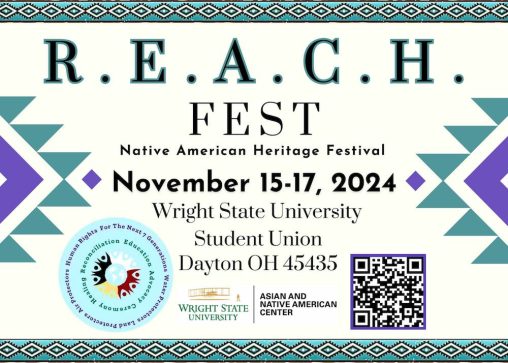The third annual R.E.A.C.H. Festival will celebrate Native American heritage and culture from Nov. 15 to 17 at Wright State University’s Student Union.
The festival is hosted by Wright State’s Asian and Native American Center and R.E.A.C.H. Indigenous Advocacy, which stands for representation and reconciliation, education and equity, advocacy and allyship, community and ceremony, and healing, health care and human trafficking.
Stephanie Van Hoose, the director of R.E.A.C.H., is a parent of a Wright State student. Nicolyn Woodcock, Ph.D., assistant director of the Asian and Native American Center, met Van Hoose’s son at an event hosted by the American Cultural Student Association.
“When she and I got together, the first thing she asked was ‘How can I help?’ but I turned that question around because I think it’s my job to understand how I can help initiatives that are already under way in our region,” Woodcock said. “With the ANA Center co-hosting R.E.A.C.H. Fest on campus, I think we’re seeing a culmination of that philosophy. It was clear to me that R.E.A.C.H. Fest is growing and needs more space, which we have on campus.”
The festival will begin on Friday, Nov. 15, at 4 p.m. with a panel on compliance with the Native American Graves Protection and Repatriation Act, in a joint session with the annual Runkle Woods Symposium, in the Discovery Room of the Student Union.
Following the panel is an opening dinner with an awards presentation, flute and hoop dance performances and a vendor market. Dinner will be catered by the Indigenous Chef, a caterer and food truck that blends Native and Latin American cuisine. Tickets are $50 per person and $25 for Wright State students for the dinner.
Woodcock encouraged Wright State students and the public to attend the festival.
“There is so much the festival is offering. Come out and see and take it in. In so much of the U.S., exposure to Indigenous peoples cast them as historical and part of the past, but the festival showcases that they are here. They are our neighbors, colleagues, and students. We are better educators, friends, and communities when we take the time to get to know Indigenous peoples for who they are now.”
The festival is free and open to the public on Saturday, Nov. 16., from 10 a.m. to 7 p.m. and Sunday, Nov. 17, from 11 a.m. to 6 p.m. in the Student Union conference wing.
Saturday’s activities will begin with opening remarks and a performance by Iron Lightning Drum in the Apollo Room.
In the Endeavour Room, attendees can view an exhibition of photos by Edward S. Curtis, who focused on photos of Native American people and the American West. Along with the photographs, contemporary artists and living relatives will display their art and will be available to talk about the photographs, including Angel Horn (Mohawk), Jillian Waterman (Saginaw Chippewa), Stephanie Tancreti (Diné) and Lawrence Reddest (Lakota).
Woodcock said she is excited to showcase the photo exhibition.
“The historical photographs by Edward S. Curtis, which have kind of frozen Native peoples in the past for American people and see them side by side with artwork by contemporary Native artists and to hear perspectives of living Native people from those Tribal Nations that Curtis’ work characterized as ‘dying’ or on the brink of disappearance,” she said.
Along with vendor booths, Cherokee elders’ storytelling and demonstrations of marbles, stickball, smoke dance, water drum and horn rattles will take place in the Apollo Room. A children’s dance competition will take place from 3 to 4 p.m.
Throughout the day, until about 4:30 p.m., attendees can get another taste of the Indigenous Chef at its food truck. At 5:30 p.m., a women veterans panel will discuss “Why We Serve,” followed by a closing prayer and announcements.
The festival will continue on Nov. 17 with opening remarks, another performance by Iron Lightning, vendors, Cherokee elders’ storytelling, demonstrations of blow darts and family craft stations.
The photography exhibit will remain open throughout the day, and attendees can experience a live episode of the “Urban Native Collective” podcast, which will discuss “Life on the Margins: An Urban Indigenous Experience.”
A second round of the children’s dance competition will be held, with a winner announced at 4:30 p.m. Following a last call for the Indigenous Chef food truck and vendors at 5:30, the festival will close with a prayer.
“This festival really does bring the Indigenous community in the Dayton region together,” Woodcock said. “I’m really excited to see how this looks, and I’m hopeful that this is only beginning a partnership that will bring the festival back to campus again and again.”
View the complete festival schedule at reachindigenousadvocacy.com/fest-schedule.


 Adventures await
Adventures await  Wright State to expand nursing facilities to meet workforce needs and prepare more graduates for in-demand careers
Wright State to expand nursing facilities to meet workforce needs and prepare more graduates for in-demand careers  Wright State student-athletes make a lasting impact on local family with more to come
Wright State student-athletes make a lasting impact on local family with more to come  Wright State names Rajneesh Suri dean of Raj Soin College of Business
Wright State names Rajneesh Suri dean of Raj Soin College of Business  ‘Only in New York,’ born at Wright State
‘Only in New York,’ born at Wright State 